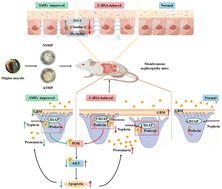Acidic Stigma maydis polysaccharides protect against podocyte injury in membranous nephropathy by maintenance of glomerular filtration barrier integrity and gut-kidney axis
Abstract
Membranous nephropathy (MN) is a chronic kidney disease and a precursor to end-stage kidney disease. In this study, we evaluated the potential protective effects of acidic and neutral Stigma maydis polysaccharides (ASMP and NSMP, respectively) on cationized bovine serum albumin-induced MN in mice. Both polysaccharides (SMPs) provided effective protection from kidney injury by decreasing daily proteinuria, kidney dysfunction, and hyperlipidemia and minimizing structural changes and immune complex expression. Furthermore, SMPs improved intestinal barrier damage by increasing the expression of tight junction proteins in the intestinal tissue. They also maintained the integrity of the glomerular filtration barrier by promoting slit diaphragm proteins expression and PI3K/AKT signaling. However, ASMP offered better protection against podocyte injury than NSMP. The use of natural polysaccharides could thus be a new protective measure against podocyte injury and perhaps be utilized for the development of functional foods to protect against MN.



 Please wait while we load your content...
Please wait while we load your content...